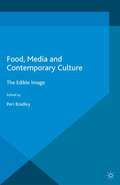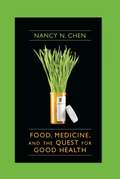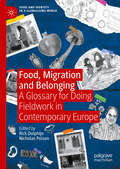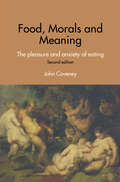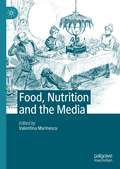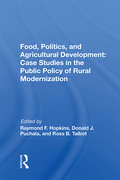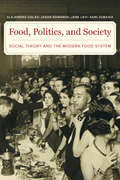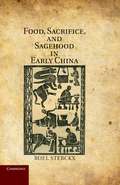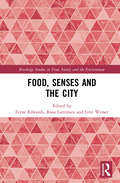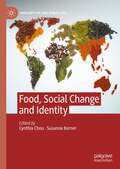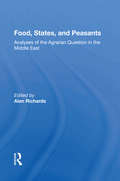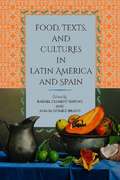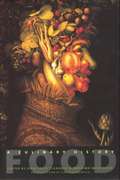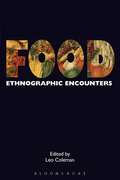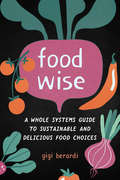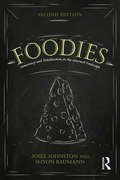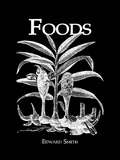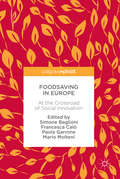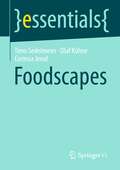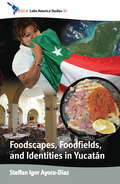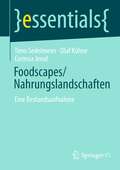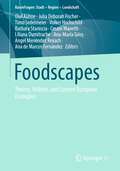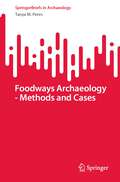- Table View
- List View
Food, Media and Contemporary Culture: The Edible Image
by Peri BradleyFood, Media and Contemporary Culture is designed to interrogate the cultural fascination with food as the focus of a growing number of visual texts that reveal the deep, psychological relationship that each of us has with rituals of preparing, presenting and consuming food and images of food.
Food, Medicine, and the Quest for Good Health
by Chen Nancy N.Drawing on medical texts and food therapy practices from around the world and throughout history, Nancy N. Chen locates old and new crossovers between food and medicine in different social and cultural contexts.
Food, Migration and Belonging: A Glossary for Doing Fieldwork in Contemporary Europe (Food and Identity in a Globalising World)
by Rick Dolphijn Nicholas PolsonThis book maps the concepts that capture changing alimentary practices, starting from the impact of migration on contemporary Europe. Our relationship with food, the members of our community with whom we share our meals, and the fertile earth, is changing fast in these times of migration and globalization. The book shows how these practices give form to a (new) world, while outlining a refreshing overview of the social and political realities that sign the times. Written by academics from both the social sciences and the humanities, together with activists, policy makers, migrants, artists and chefs, every contribution is deeply entangled with the changing realities of everyday life today.
Food, Morals and Meaning: The Pleasure and Anxiety of Eating
by John CoveneyFirst published in 2006. Food, Morals and Meaning examines our need to discipline our desires, our appetites and our pleasures at the table. However, instead of seeing this discipline as dominant or oppressive it argues that a rationalisation of pleasure plays a positive role in our lives, allowing us to better understand who we are. The book begins by exploring the way that concerns about food, the body and pleasure were prefigured in antiquity and then how these concerns were recast in early Christianity as problems of 'natural' appetite which had to be curbed. The following chapters discuss how scientific knowledge about food was constructed out of philosophical and religious concerns about indulgence and excess in 18th and 19th Century Europe. Finally, by using research collected from in-depth interviews with families, the last section focuses on the social organisation of food in the modern home to illustrate the ways that the meal table now incorporates the principles of nutrition as a form of moral training, especially for children. Food, Morals and Meaning will be essential reading for those studying nutrition, public health, sociology of health and illness and sociology of the body.
Food, National Identity and Nationalism: From Everyday to Global Politics
by Atsuko Ichijo Ronald RantaExploring a much neglected area, the relationship between food and nationalism, this book examines a number of case studies at various levels of political analysis to show how useful the food and nationalism axis can be in the study of politics.
Food, Nutrition and the Media
by Valentina MarinescuPlaced at the crossroads of diverse disciplines – medical sciences, information and communication science, sociology of food, agricultural sciences – this book focuses on media, food and nutrition. Contributors to this volume come from different countries including the United Kingdom, Germany, Mexico and Romania, and consider comparatively their native cultures. The book answers several questions: How are food and nutrition made visible and publicized? What is the role of media in relation to food and nutrition? What are the strategies of discourses surrounding food and nutrition within new public spaces?
Food, Politics, And Agricultural Development: Case Studies In The Public Policy Of Rural Modernization
by Donald J. Puchala Raymond F. Hopkins Ross B. TalbotThis collection of studies on the politics of agricultural development in regions of Asia and Africa emphasizes the need for steady and significant increases in food production in the developing countries. It is a set of exercises in the comparative analysis of agricultural modernization policies.
Food, Politics, and Society: Social Theory and the Modern Food System
by Alejandro ColasFood and drink has been a focal point of modern social theory since the inception of agrarian capitalism and the industrial revolution. From Adam Smith to Mary Douglas, major thinkers have used key concepts such as identity, exchange, culture, and class to explain the modern food system. Food, Politics, and Society offers a historical and sociological survey of how these various ideas and the practices that accompany them have shaped our understanding and organization of the production, processing, preparation, serving, and consumption of food and drink in modern societies. Divided into twelve chapters and drawing on a wide range of historical and empirical illustrations, this book provides a concise, informed, and accessible survey of the interaction between social theory and food and drink. It is perfect for courses in a wide range of disciplines.
Food, Sacrifice, and Sagehood in Early China
by Roel SterckxIn ancient China, the preparation of food and the offering up of food as a religious sacrifice were intimately connected with models of sagehood and ideas of self-cultivation and morality. Drawing on received and newly excavated written sources, Roel Sterckx's book explores how this vibrant culture influenced the ways in which the early Chinese explained the workings of the human senses, and the role of sensory experience in communicating with the spirit world. The book, which begins with a survey of dietary culture from the Zhou to the Han, offers intriguing insights into the ritual preparation of food - some butchers and cooks were highly regarded and would rise to positions of influence as a result of their culinary skills - and the sacrificial ceremony itself. As a major contribution to the study of early China and to the development of philosophical thought, the book will be essential reading for students of the period, and for anyone interested in ritual and religion in the ancient world.
Food, Senses and the City (Routledge Studies in Food, Society and the Environment)
by Ferne Edwards Roos Gerritsen Grit WesserThis work explores diverse cultural understandings of food practices in cities through the senses, drawing on case studies in the Americas, Asia, Australia, and Europe. The volume includes the senses within the popular field of urban food studies to explore new understandings of how people live in cities and how we can understand cities through food. It reveals how the senses can provide unique insight into how the city and its dwellers are being reshaped and understood. Recognising cities as diverse and dynamic places, the book provides a wide range of case studies from food production to preparation and mediatisation through to consumption. These relationships are interrogated through themes of belonging and homemaking to discuss how food, memory, and materiality connect and disrupt past, present, and future imaginaries. As cities become larger, busier, and more crowded, this volume contributes to actual and potential ways that the senses can generate new understandings of how people live together in cities. This book will be of great interest to students and scholars of critical food studies, urban studies, and socio-cultural anthropology.
Food, Social Change and Identity (Consumption and Public Life)
by Susanne Kerner Cynthia ChouUnlike food publications that have been more organized along regional or disciplinary lines, this edited volume is distinctive in that it brings together anthropologists, archaeologists, area study specialists, linguists and food policy administrators to explore the following questions: What kinds of changes in food and foodways are happening? What triggers change and how are the changes impacting identity politics? In terms of scope and organization, this book offers a vast historical extent ranging from the 5th mill BCE to the present day. In addition, it presents case studies from across the world, including Asia, the Pacific, the Middle East, Europe and America. Finally, this collection of essays presents diverse perspectives and differing methodologies. It is an accessible introduction to the study of food, social change and identity.
Food, States, And Peasants: Analyses Of The Agrarian Question In The Middle East
by Alan RichardsOne of the most serious problems facing the Middle East and North Africa · is the region's growing inability to feed its expanding population. Rapidly escalating demand has made the region highly dependent on food imports, and policy initiatives intended to increase domestic production have met with mixed success at best. The contributors to this volume examine the historical origins of state policies toward agriculture, recent policy changes and their effects on domestic supply, and the social and political implications of these shifts. Focusing on the region's largest agricultural economies, contributors analyze Turkey's strong performance as well as Egypt's weak response to its agricultural problems. Pricing, investment strategies, irrigation policies, and the impact of large-scale labor migration on agricultural sectors are discussed, and a common theme of the interplay between politics and economics runs throughout.
Food, Texts, and Cultures in Latin America and Spain
by Rafael Climent-Espino Ana M. Gómez-BravoThe fourteen essays in Food, Texts, and Cultures in Latin America and Spain showcase the eye-opening potential of a food lens within colonial studies, ethnic and racial studies, gender and sexuality studies, and studies of power dynamics, nationalisms and nation building, theories of embodiment, and identity. In short, Food, Texts, and Cultures in Latin America and Spain grapples with an emerging field in need of a foundational text, and does so from multiple angles. The studies span from the Middle Ages to the twenty-first century, and the contributing scholars occupy diverse fields within Latin American and Hispanic Studies. As such, their essays showcase eclectic critical and theoretical approaches to the subject of Latin American and Iberian food.Food, Texts, and Cultures in Latin America and Spain also introduces the first English-language publication of works from such award-winning scholars as Adolfo Castañón of the Mexican Academy of Language; Sergio Ramírez, winner of the 2017 Miguel de Cervantes Prize in Literature; and Carmen Simón Palmer, winner of the 2015 Julián Marías Prize for Research.
Food, Texts, and Cultures in Latin America and Spain
by Rafael Climent-Espino and Ana M. Gómez-BravoA foundational text in the emerging field of Latin American and Iberian food studies
Food: A Culinary History (European Perspectives: A Series in Social Thought and Cultural Criticism)
by Montanari Massimo Flandrin Jean-LouisWhen did we first serve meals at regular hours? Why did we begin using individual plates and utensils to eat? When did "cuisine" become a concept and how did we come to judge food by its method of preparation, manner of consumption, and gastronomic merit?Food: A Culinary History explores culinary evolution and eating habits from prehistoric times to the present, offering surprising insights into our social and agricultural practices, religious beliefs, and most unreflected habits. The volume dispels myths such as the tale that Marco Polo brought pasta to Europe from China, that the original recipe for chocolate contained chili instead of sugar, and more. As it builds its history, the text also reveals the dietary rules of the ancient Hebrews, the contributions of Arabic cookery to European cuisine, the table etiquette of the Middle Ages, and the evolution of beverage styles in early America. It concludes with a discussion on the McDonaldization of food and growing popularity of foreign foods today.
Food: Ethnographic Encounters (Encounters: Experience and Anthropological Knowledge Series #3)
by Leo ColemanFood preparation, consumption, and exchange are eminently social practices, and experiencing another cuisine often provides our first encounter with a different culture. This volume presents fascinating essays about cooking, eating, and sharing food, by anthropologists working in many parts of the world, exploring what they learned by eating with others. <p><p> These are accounts of specific experiences - of cooking in Mombasa, shopping for organic produce in Vienna, eating vegetarian in Vietnam, raising and selling chickens in Hong Kong, and of refugees subsisting on food aid. With a special focus on the experience and challenge of ethnographic fieldwork, the essays cover a wide range of topics in food studies and anthropology, including food safety and food security, cultural diversity and globalization, colonial histories and contemporary identities, and changing ecological, social, and political relations across cultures. <p><p> Food: Ethnographic Encounters offers readers a broad view of the vibrancy of local and global food cultures, and provides an accessible introduction to both food studies and contemporary ethnography.
FoodWISE: A Whole Systems Guide to Sustainable and Delicious Food Choices
by Gigi BerardiThe definitive food lover's guide to making the right choices amidst a sea of ever-changing informationWe live in a culture awash with advice on nutrition and eating. But what does it really mean to eat healthy? FoodWISE is for anyone who has felt unsure about how to make the &“right&” food choices. It is for food lovers who want to be more knowledgeable and connected to their food, while also creating meaningful dining experiences around the table. With more than thirty years of experience in farm and food studies, Gigi Berardi, PhD, shows readers how to make food choices and prepare meals that are WISE: Whole, Informed, Sustainable, and Experience based. She offers practical guidance for how to comb the aisles of your local food market with confidence and renewed excitement and debunks the questionable science behind popular diets and trends, sharing some counterintuitive tips that may surprise you—like the health benefits of eating saturated fat! FoodWISE will revolutionize how you think about healthy, enjoyable, and socially conscious cuisine.
Foodies: Democracy and Distinction in the Gourmet Foodscape (Cultural Spaces)
by Josee Johnston Shyon BaumannThis important cultural analysis tells two stories about food. The first depicts good food as democratic. Foodies frequent ‘hole in the wall’ ethnic eateries, appreciate the pie found in working-class truck stops, and reject the snobbery of fancy French restaurants with formal table service. The second story describes how food operates as a source of status and distinction for economic and cultural elites, indirectly maintaining and reproducing social inequality. While the first storyline insists that anybody can be a foodie, the second asks foodies to look in the mirror and think about their relative social and economic privilege. By simultaneously considering both of these stories, and studying how they operate in tension, a delicious sociology of food becomes available, perfect for teaching a broad range of cultural sociology courses.
Foods
by SmithFirst published in 2006. Routledge is an imprint of Taylor & Francis, an informa company.
Foodsaving in Europe
by Simone Baglioni Francesca Calò Paola Garrone Mario MolteniThis book provides comparative, multi-disciplinary research on the surplus food distribution in Europe and its relation to food poverty, with a focus on the interaction of for-profit and non-profit organisations. It offers an informed and rich discussion in understanding the collaboration between profit and non-profit organisations involved in food recovery dynamics, and provides understanding as to how the two types of players create effective, innovative and sustainable processes. Building on sociology, food justice, and sustainable management fields, the book will be of interest to a diverse range of scholars, policy makers and practitioners inspiring innovation in how to address food poverty through surplus food recovery.
Foodscapes (essentials)
by Olaf Kühne Corinna Jenal Timo SedelmeierThis book deals with foodscapes, which are still a relatively young field of research in the social sciences and were first addressed in the context of questions of spatial inequality in the mid-1990s. In addition to an introduction to various landscape concepts as well as a brief historical outline on the geographical study of food, the volume focuses on the multidimensionality of foodscapes and illustrates this with two case studies.
Foodscapes, Foodfields, And Identities In Yucatan
by Steffan Igor Ayora-DiazThe state of Yucatán has its own distinct culinary tradition, and local people are constantly thinking and talking about food. They use it as a vehicle for social relations but also to distinguish themselves from "Mexicans." This book examines the politics surrounding regional cuisine, as the author argues that Yucatecan gastronomy has been created and promoted in an effort to affirm the identity of a regional people and to oppose the hegemonic force of central Mexican cultural icons and forms. In particular, Yucatecan gastronomy counters the homogenizing drive of a national cuisine based on dominant central Mexican appetencies and defies the image of Mexican national cuisine as rooted in indigenous traditions. Drawing on post-structural and postcolonial theory, the author proposes that Yucatecan gastronomy - having successfully gained a reputation as distinct and distant from 'Mexican' cuisine - is a bifurcation from regional culinary practices. However, the author warns, this leads to a double, paradoxical situation that divides the nation: while a national cuisine attempts to silence regional cultural diversity, the fissures in the project of a homogeneous regional identity are revealed.
Foodscapes/Nahrungslandschaften: Eine Bestandsaufnahme (essentials)
by Olaf Kühne Corinna Jenal Timo SedelmeierDas Buch befasst sich mit Nahrungslandschaften, sogenannten ‚foodscapes‘, die ein noch recht junges Forschungsfeld der Sozialwissenschaften darstellen und im Kontext von Fragen der räumlichen Ungleichheit ab Mitte der 1990er Jahre erstmals thematisiert wurden. Neben einer Einführung in verschiedene Landschaftskonzepte sowie einem kurzen historischen Abriss zur geographischen Auseinandersetzung mit Nahrungsmitteln fokussiert der Band auf die Multidimensionalität der Nahrungslandschaften und verdeutlicht diese an zwei Fallbeispielen.
Foodscapes: Theory, History, and Current European Examples (RaumFragen: Stadt – Region – Landschaft)
by Olaf Kühne Timo Sedelmeier Julia Deborah Fischer Volker Hochschild Barbara Staniscia Cesare Manetti Liliana Dumitrache Ana-Maria Taloș Angel Menéndez Rexach Ana de Marcos FernándezSince the mid-1990s, the term 'foodscapes' has been used. Its reference to landscape opens it up to a wide theoretical variety and numerous methodological approaches. Through the large 'semantic yard' of the concept of landscape it becomes clear that the approach of foodscapes aims less at the description or pure positivistic analysis of the production, distribution and consumption of food, but is rather open to aesthetic approaches, normative questions, aspects of the connection of food and space with meaning. In this respect, research on foodscapes is not simply a part of food geography but reaches beyond it. With this anthology we contribute to the development of the research field on foodscapes and combine diverse perspectives from different disciplines, locations and theoretical as well as methodological backgrounds on the diversity of what foodscapes can be. Our anthology 'Foodscapes - Theory, History, and Current European Examples' is the result of the collaboration of lecturers and students from the universities of Bucharest, Madrid, Rome and Tübingen.
Foodways Archaeology - Methods and Cases (SpringerBriefs in Archaeology)
by Tanya M. PeresThis volume presents an overview of methodologies to identify and study foodways in the archaeological record. It also includes definitions, information, and examples for students and professionals to understand the basic analytical approaches, methods, and themes critical to archaeological studies of foodways. One of the main goals of this book is to show that foodways can help us better understand many aspects of a culture and can be studied from the material culture recovered from archaeological sites. It is important to stress that foodways are, and should be, studied by more than zooarchaeologists and paleoethnobotanists. Foodways encompass the biological and cultural need for sustenance, and thus are a research area that incorporates a multitude of artifact types, analytical specialties, and research questions.Foodways are a tangled web of ideas and behaviors that structure diet, subsistence strategies, cuisines, and the use of food to express identity. While foodstuffs are primary components to foodways, the consumption of material foods is inherently social. Food, dishes, and cuisines are expressions of the people, culture, and time in which they are created. Foodways Archaeology is devoted specifically to the archaeological study of the intersection of food, culture, history, and traditions as viewed in the archaeological record.
